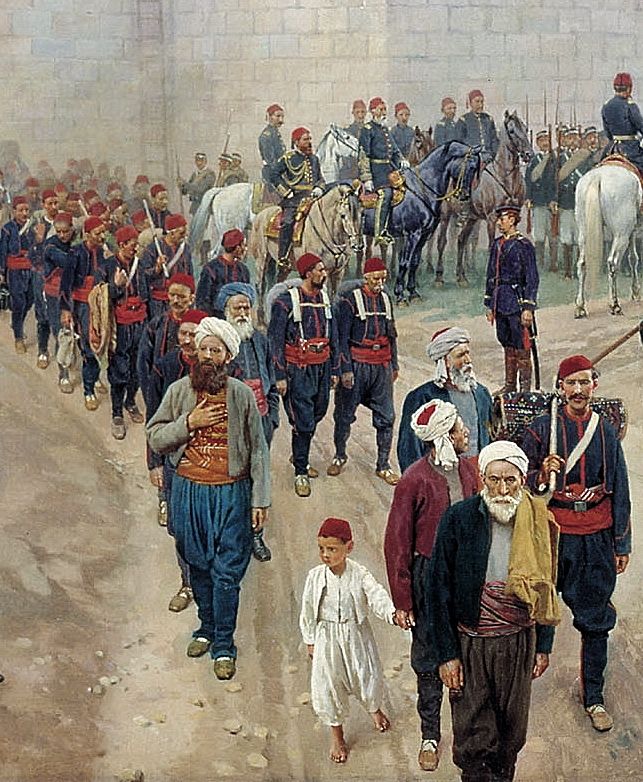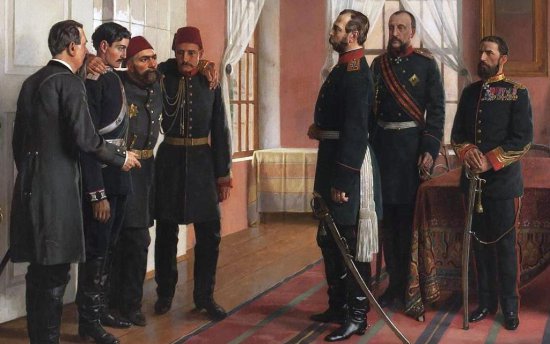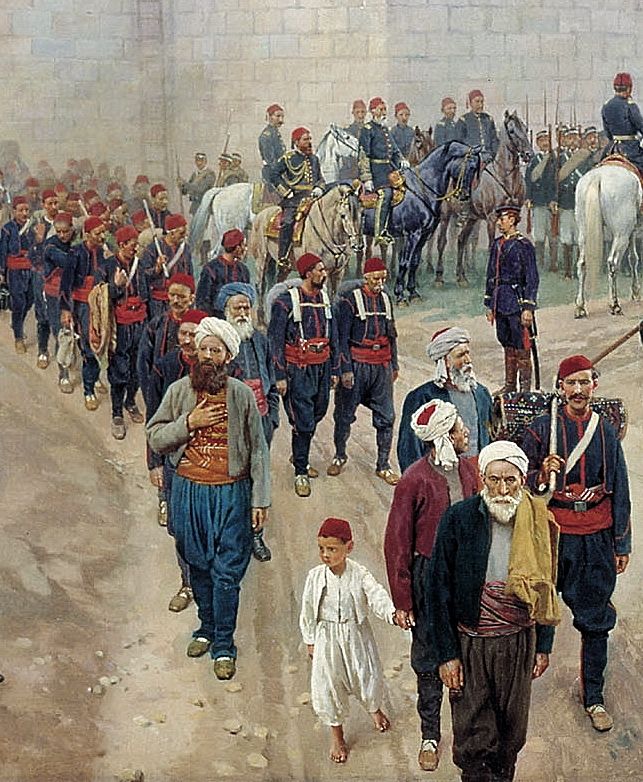
TRAGEDY OF RUSSO-TURKISH WAR CAUSED BY BUREAUCRACY
In the 1877 Ottoman-Russian War (the Russo-Turkish war), which is famously known in folk culture as the War of '93 because it took place in the year 1293 in the Julian calendar, the Ottoman army and navy, which had global power, were defeated by Russia due to mismanagement.
This war, which was extremely senseless and without reason, is crucial in terms of its outcomes. The 30-year bureaucratic rule led to the war, and the results of the war determined the fate of the Ottoman Empire.
Everything that happened afterward somehow connects back to this battle. The despotism that many constantly talk about, the subsequent Constitutional Monarchy, and the dissolution of the empire are all the products of the downward slope that began with the War of '93.
The loss of Serbia, Montenegro, Romania, Kars, Ardahan, Artvin, Batum, and the gradual loss of homeland territories like Cyprus, Egypt, and Tunisia are all short-term consequences of the war.
Who Would Win?
At the start of the war, it could not be said that the Russians would defeat the Turks. If there had been competent commanders and units, it would have been possible to stop the Russians at the Danube. Even so, Russia experienced critical moments.
Alongside the Russians were Greece, Romania, Serbia, and Montenegro. As usual, the Turks were alone. Just a year before, they had been dealing with the Herzegovina and Bulgarian uprisings and had fought a war with Serbia and Montenegro, which left them exhausted.
If we recall the vast distance between Russian and Turkish forces, it becomes clearer the global position and role of the Ottoman Empire at that time.
Fortunately, the Ottoman Empire’s great enemy and rival in Europe, the Germans, did not engage in any war with the Ottoman State after 1792.
Instead, Russia took the place of the Ottoman Empire’s greatest enemy. The largest part of the massive Russian territory was taken from the Turks. Even now, a Turkish population as large as the Ottoman Turks still lives in Russia.
The Greatest Catastrophe
After the Herzegovina rebellion, the Ottomans were asked to withdraw from the lands they had advanced into and occupied during the war with Serbia and Montenegro.
The coup plotters, who placed two sultans on the throne and drove one to death and the other to madness, rejected this offer from Russia, which sought to calm public opinion. They risked war for the sake of not giving two Orthodox towns in Herzegovina to Montenegro.
On April 24, 1877, Russia declared war on the Ottoman Empire. If the war had been only with Russia, it was hoped that victory could be achieved. Indeed, victories were won in the early stages. But when the Balkan principalities allied with Russia, defeat became inevitable. This defeat is one of the greatest, perhaps the first, calamities in Turkish-Islamic history.
The war resulted in territorial losses even more severe than those of the Treaty of Karlowitz in 1699. Over a million Muslims were forced to abandon the lands they had lived in for centuries, dispersing into the heart of the homeland.
The war did not take place in the battlefields with courtesy and chivalry. The civilian population suffered greatly as well. The social structure was upended.
What Could He Do?
Although Sultan Abdulhamid II had no responsibility for the war, he desperately did everything in his power to avoid entering the war and to ensure victory once it had begun.
He also made every effort, within the realm of possibility, to alleviate the disastrous situation that emerged after the war for the benefit of the country.
He removed the culprits from their positions one by one, dissolved the parliament, which was one of the primary causes of the war, and did not reconvene it out of fear that it might lead to another disaster.
The old coup plotters, Abdul Kerim and Redif Pashas, were brought to military court as the ones responsible for the defeat, but they managed to escape punishment from there as well.

Opposition Pretext
One of the deputies, Ahmed Efendi, the cloth merchants' representative, complained that the war was not being managed and directed by the parliament, and he harshly criticized the government, even the Sultan.
However, everywhere in the world, wars are managed by the war cabinet, not by the parliament. The recent publication of some secret documents by the Turkish Historical Society has completely debunked the absurd claim that the war was lost because it was run from the palace.
During the War of '93, active pashas frequently complained to the palace about each other and each other's plans. Upon receiving so many complaints, the palace sometimes canceled plans or removed certain pashas from their posts. However, this cannot be generalized to the entire situation.
Moreover, the military bureaucracy was trying to discipline the Sultan and, in situations where they should have taken initiative, they remained inactive, saying, "We have not received orders from the palace."
No One Takes Responsibility
Süleyman Pasha practically sacrificed his own soldiers at Shipka, yet he blamed Mehmed Ali Pasha for the defeat. In this way, he managed to get Mehmed Ali Pasha removed and himself appointed in his place.
The civilian and military bureaucracy, which was the true culprit, completely blamed the Sultan in an effort to escape responsibility. Led by Damat Mahmud Pasha, they incited the deputies and the public in this direction.
The Sultan reacted strongly to this. However, due to subsequent events, he was accepted as practically the first and only one responsible for the defeat. Like many other matters, this defeat was used as a means of opposition against the Sultan.
Lack of Leaders
When the war with the Russians began, the Ottomans made a very strategic mistake by opting for defense for certain reasons. They allowed the Russians to cross the Danube with ease.
At that time, Osman Nuri Pasha, who was stationed in Vidin, sent a telegram to Commander-in-Chief Abdülkerim Nadir Pasha, suggesting that the best place to confront the Russians after they crossed the Danube was Plevna, and he offered to defend it if given permission. Nadir Pasha, possibly out of fear, did not even respond.
Realizing this, the Sultan himself sent a telegram to Osman Pasha, saying, "Go to Plevna immediately. All responsibility rests with the palace." This means Sultan Abdulhamid II's intervention was there at the very beginning of the famous defense of Plevna.
Scandal
Who was Nadir Pasha? He was part of the group that staged a coup against Sultan Abdulaziz. Before that, he had participated multiple times in Avni Pasha’s assassination attempts against Sultan Abdulaziz.
Another scandal is this: Nadir Pasha did not believe the telegrams from Osman Pasha reporting the victories in the First and Second Battles of Plevna. As a result, Osman Pasha was left unsupported during the Third Battle of Plevna.
Nadir Pasha's successor, Mehmed Ali Pasha, was not a soldier capable of winning, let alone managing, a major war. Moreover, he had many enemies and rivals within the military. These individuals would rather see the war lost than witness the Pasha succeed.
His slow and hesitant actions during the war gave the enemy a crucial two weeks. Indeed, the defeat at Tserkovnia (Çayırköy) on September 21 marked the turning point of the war.
After the defeat at Plevna, the army disintegrated and retreated. The enemy crossed the Maritsa River and occupied Edirne. Çatalca fell. The Russians set up headquarters at Aya Stephano (Yeşilköy), refraining from entering the city out of courtesy.
Meanwhile, Muhtar Pasha, whose two staff commanders had been killed, did not continue the battle. He withdrew using a tactic taught to students at European war academies. Kars fell on November 18. For saving the army from complete annihilation, the title of "Ghazi" (veteran) was bestowed upon him.

Consolation of Plevna
While Osman Nuri Pasha fought valiantly against the Russians, the Czar said, "Wherever we cross the Danube, the Ottomans destroy us." Upon this, the Romanians entered the war, and with the reinforcements they received, the Russians were able to break the defense of Plevna.
Facing the Ottomans were Russia, Romania, Serbia, Montenegro, Greece, and Bulgarian volunteer units. The Romanians, with a fresh force of 50,000 men, had promised to remain neutral if they were granted independence before the war, but the Ottoman bureaucracy arrogantly rejected this.
Had the Romanians not joined, Osman Pasha would have already stopped the Russians. Even after they joined, he defeated the enemy once again. This is why Sultan Abdulhamid II held him in such high regard.
For two centuries, Muslims had continually lost wars, and victories like that of Plevna were a source of consolation. It is understandable to grasp this state of mind. Other commanders could not accomplish even a thousandth of what was done at Plevna.
Süleyman Pasha, from the group that had staged the coup against Sultan Abdulaziz, was repeatedly defeated by the Russians at Shipka.
Then there was Hüseyin Pasha, one of the commanders of the Caucasian front, known as "The Butcher." He was the brother-in-law of coup leader Avni Pasha. He could not resist. He surrendered to the Russians with 17,000 soldiers, who had provisions for one year—a formidable number. This incident, of course, revived the enemy.
During the disastrous days of the War of '93, the Sultan tried to achieve something and win the war with such people. As the saying goes, "With such fabric, such clothes are made."
Önceki Yazılar
-
IF TIME DOES NOT ADJUST TO YOU, THEN YOU ADJUST TO TIME!16.07.2025
-
THE OTTOMAN DYNASTY AND QURAYSH9.07.2025
-
"WOE TO THE ENEMIES OF THE REVOLUTION!" What Was The People’s Reaction To The Kemalist Revolutions?2.07.2025
-
DEATH IS CERTAIN, INHERITANCE IS LAWFUL!25.06.2025
-
THE SECRET OF THE OTTOMAN COAT OF ARMS18.06.2025
-
OMAR KHAYYAM: A POET OF WINE OR THE PRIDE OF SCIENCE?11.06.2025
-
CRYPTO JEWS IN TURKEY4.06.2025
-
A FALSE MESSIAH IN ANATOLIA28.05.2025
-
WAS SHAH ISMAIL A TURK?21.05.2025
-
THE COMMON PASSWORD OF MUSLIMS14.05.2025